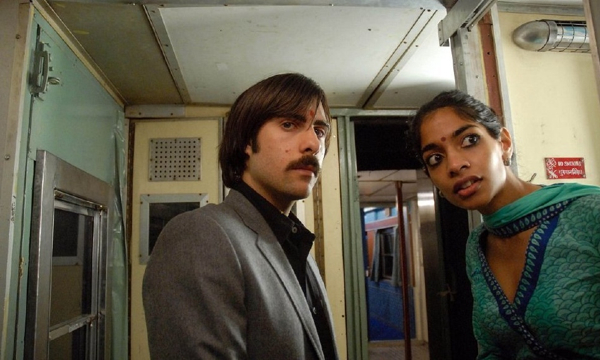Movie review by Greg Carlson
Wes Anderson’s fifth feature, “The Darjeeling Limited,” can be as sweet and seductive as Claude Debussy’s “Clair de Lune,” one of the many beautiful pieces of music selected to play on the movie’s soundtrack. An homage to several memorable India-set films, most notably Jean Renoir’s “The River,” “The Darjeeling Limited” works as both colorful travelogue and as another of the director’s examinations of young men coping with the no man’s land between immaturity and wisdom. Anderson’s recognizable stylistic touches bloom across the frames from first scene to last, and the screenplay, co-written by the director with Jason Schwartzman and Roman Coppola, combines the touching and the absurd as effectively as any of Anderson’s earlier efforts.
Moving into wider release, “The Darjeeling Limited” is now prefaced by its official Part 1, the thirteen-minute short “Hotel Chevalier.” Previously available for viewing online, “Hotel Chevalier” proves critical to the success of the central attraction, establishing both important character information as well as a number of thematic motifs that reappear all the way to the end of “The Darjeeling Limited.” The short prologue, which introduces Whitman brother Jack (Jason Schwartzman) and his unnamed ex-lover (Natalie Portman), is set in boudoir 403 in the titular Parisian lodging. The coy and enigmatic pas de deux withholds as much as it reveals, but the details we do see are both arresting and consequential.
Once the feature begins, Schwartzman’s lovesick Jack joins brothers Francis (Owen Wilson) and Peter (Adrien Brody), roughly one year following the death of their father, in order to journey by train through India. Each member of the trio arrives with literal and metaphorical baggage; Louis Vuitton artistic director Marc Jacobs designed the exquisite caramel-colored luggage set, embossed with wildlife illustrations by Anderson’s brother and regular collaborator Eric. The Whitmans themselves are wounded either in body or in psyche. Francis has sustained trauma in a motorcycle crash and his head is elaborately bandaged. Peter struggles to cope with the life changes that will accompany the upcoming birth of his child. Jack, still in possession of the code to his former girlfriend’s answering machine, calls in presumably to both torture himself and satisfy his curiosity.
Like “The River,” “The Darjeeling Limited” presents India through Western eyes, embracing and perpetuating images of vivid exoticism, spiritual enlightenment, and aromatic perfumes and spices. It is a limited reading, and the movie offers only a small handful of Indians fully developed as characters, but Anderson, like Renoir, recognizes his position as the tourist, and gleefully makes sport of the Whitman brothers. As coarse Americans behaving tactlessly, they gulp cold medicine, pop pills, and smoke in their no-smoking compartment. Peter purchases a venomous cobra and Jack pursues an affair with the pretty attendant Rita (Amara Karan). The constant squabbling and petulance of the siblings irritates the Darjeeling Limited’s Chief Steward (Waris Ahluwalia), who always seems on the verge of kicking the fellows off the train.
Where exactly “The Darjeeling Limited” will fit within the Anderson oeuvre can only be guessed. One supposes it will depend in part on how many more films he makes. Anderson’s meticulous, and at times airless, focus on composition and mise en scene over everything else entrances some and infuriates others. “The Darjeeling Limited” might feel like self-indulgence or self-examination, depending on one’s disposition, but either way it demands attention and consideration, a feat few moviemakers manage to accomplish with a single feature let alone a quintet.
